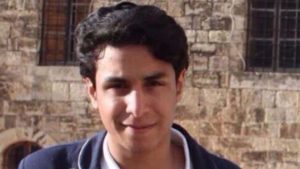14 دی 1388
Source: http://schrr.net/spip.php?article7722
An interview with Benyamin Rasouli, a young man rescued from execution
In the Islamic Shaira Law practiced and imposed in Iran, in the case of murder (first or second degree, and even at times manslaughter), the family of the victim has the final say. They can either opt for Qesas, an eye for an eye punishment which would be execution in case of homicide, or forgive the defendant in return for Diah, or “blood money.”
Article 37 of the UN Convention on the Rights of the Child states that “…capital punishment nor life imprisonment without possibility of release shall be imposed for offences committed by persons below eighteen years of age.” Iran is a signatory to this convention [and has accepted this section without any condition]. Nevertheless, several young offenders in Iran are hanged each year.
The punishment for youth who commit murder, drug smuggling, and engagement in sexual relationships is punishable by death- this has been one of the most important human rights challenges in Iran.
Adolescents accused of murder committed the crime at a young age on another person their age as a result of immature conflicts. These youth are sentenced to death for manslaughter (homicide without premeditation and often accidental). Benyamin Rasouli is one of the youth who was released after the family of the victim forgave him. What follows is an interview conducted with Benyamin by Saba Vasefi.
Q: How was Hossein [the victim] killed?
A: They had beaten up my friend Shahram. I went to make peace between them, but the tension grew. When they were in our neighbourhood, they got beaten up. Then, they said, if you’re a man, come to the park. I went there, there were 12 of them, and there was nobody from our neighbourhood. I escaped from them, returned home, grabbed my knife, and returned to the park. I really did not realize how and when he was stabbed. But I found out later that the knife had cut through his ribs and he had died in the hospital.
Q: Who had given you the knife?
A: It was wooden handle knife given to me by a friend as a souvenir from northern Iran.
Q: How old were you at the time of the incident?
A: I was 15. I was so small that when the police officer saw me, he was very surprised and said, “Are you Benyamin? You’re so tiny!”
Q: Where were you arrested?
A: A few police officers came to our house 20 minutes after the incident. One of them was Safar Ali Nasiri who was later executed in Rajayi Shahr Prison [A notorious prison in Karaj, known for holding dangerous criminals].
Q: You went to the police station alone?
A: Yes, they gave the address to my parents and told them to follow us. They handcuffed me from behind and threw me into the trunk of the car.
Q: Did you confess to the murder when you got to the police station?
A: I could not believe the knife had hit him [Hossein]. In the station, they beat me up with a hose filled with pellets so I would confess where I had put the knife. I was subject to “chicken torture” three times, and they hung me [by my hand] once. After I told them about the whereabouts of the knife, they showed me the pictures of three bodies which were found near the railroad in Mehrshahr. They wanted me to confess to those murders too.
Q: Can you describe “chicken torture”?
A: They handcuff the person, pass the knee from the space between the arms, and pass a metal bar between the legs and put each end of the bar on a chair. Then they beat you while you swing from one side to the other. In that situation, the only thing you can do is scream.
Q: How long were you in the police station?
A: One month and 28 days. I was in the room for two weeks. During all this time, I was handcuffed. They cuffed my ankles so tight that I lost all the hair on my legs.
Q: How long were you subject to corporal punishment?
A: Starting from 20 days before the court date, they stopped beating me so the bruises would disappear.
Q: On the day of the court, there was no bruises or wounds on your body?
A: No, all that was left was a big yellow spot.
Q: Did you witness other people being subject to corporal punishment?
A: There were two people who were arrested for drug dealing. When they were taking them for beatings, they would dislocate their shoulders and would fix it after they got beaten. Hesarak police station is like hell. If they cannot force a confession in Shahpour station, which has a notorious reputation, they bring the accused to Hesarak.
Q: When you were transferred to prison, were you beaten again?
A: When I was transferred to the prison, the head of the prison took me for a tour to show me around. He said, “Walk on the ceramic hallway and think that on one side there is a valley, and on the other, people. If someone pushes you, which side will you jump to?” I replied “Well, since there is the question of my life, it is allowed to jump on people.” I was seriously thinking that way, but I was beaten badly for those words.
Q: How were you spending your days in prison?
A: In Prison Council I was working with Ali Mahintorabi. We were publishing a 30 page journal with the help of the women’s ward.
Q: What were you feeling when they handed down the death sentence?
A: I was constantly having a nightmare.
Q: What nightmare?
A: I dreamed I was in a courtyard surrounded by trees. Behind the trees was a wall, and in the middle was the gallows. When I was walking toward the trees, they wanted to execute me. When I was walking toward the wall, a ghost would come out and push me to the gallows.
Q: Were any of your cellmates executed?
A: Yes, Behnoud Shojaee and Sattar Shiri.
Q: What did you feel after their deaths?
A: I was not able to sleep for two months, I was constantly talking to myself, and I developed nervous ticks.
Q: Do you remember Sattar’s last night?
A: He was crying a lot. He was saying, “I know that this time they will hang me. I feel sorry for my family.”
Q: What about Behnoud?
A: Behnoud was not crying, he was really quiet. Not a night went by without his nightly prayers. There, many of the kids get addicted. They learn many news criminal skills, but Behnoud had given everything up. He was only calling on God. His book of prayer had turned yellow. The night before his execution everyone was crying for him. He was so quiet and innocent that everyone had fallen in love with him.
Q: After Behnoud didn’t return to the cell, what did the guys do?
A: We held a memorial for him. We all wore black until the 40th day following his death. The night before his execution he was saying that there was a 99% chance he would be executed, unless a miracle happened and God beamed a light into the hearts of the victim’s family.
Q: When the family of Hossein forgave you, what feeling did you have?
A: When they forgave me, I thought it was a lie, because many of the families would bluff like that. The family of the victim in the case of Behnoud had said that she would forgive once they put the noose around Behnoud’s neck, but she was the one who kicked the stool from below Behnoud’s feet. I told myself, they are lying in my case as well.
Q: How many siblings do you have?
A: We are six and I have a half sister.
Q: Who was able to obtain the forgiveness of the victim’s family?
A: I owe it to my lawyer Ms. Tahmasbi and my sister. When I was released, I wanted to kiss their feet. They worked really hard. My lawyer without any expectation was able to reduce the blood money from $250,000 to $50,000.
Q: Now how do you find life outside prison?
A: Everything seems so strange and foreign. I feel my dad’s absence. I cannot believe he is dead. When I was in prison, he suffered from a concussion as a result of a car accident and died. Since I did not see him, I was not able to believe his death.
Q: How do you want to live from now on?
A: I want to enjoy everything to the fullest. I wake up in the middle of the night and I open my eyes. I am really tired, but I don’t want to close my eyes. I get up and kiss my mom. I want to compensate for the days I left her alone. I know hair styling. I want to go work in a hair salon so that my mom can have a comfortable life. I would like to work with the Children’s Rights Association to be able to satisfy the victims’ families to forgive anywhere in Iran.
Q: Do you think the death penalty is an appropriate punishment for children who commit a crime while they are under 18 years of age?
A: For any child, going to prison in these conditions is a hundred times worse than death. Execution is just one moment. They pull the stool from under your feet, your neck breaks, and you suffocate. However, prison is hell. You go to prison with an accusation, you come out with thousands of diseases and disorders. Over there, weaker kids are subject to all types of abuse. Depression, addiction, and AIDS, each one is 1000 times worse than death.
![]() Siavosh, Persian2English
Siavosh, Persian2English



